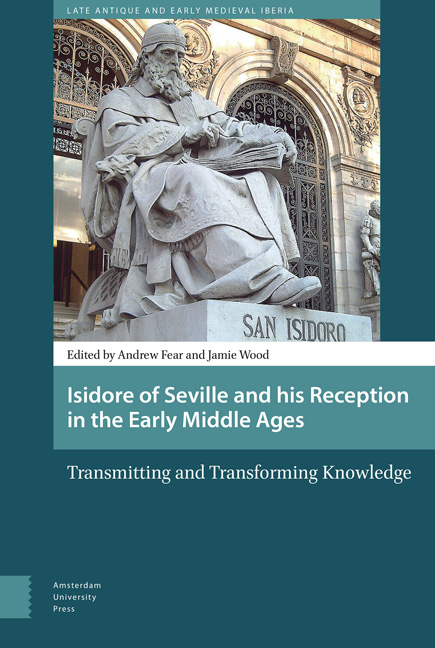 Isidore of Seville and his Reception in the Early Middle Ages
Isidore of Seville and his Reception in the Early Middle Ages Book contents
- Frontmatter
- Contents
- Preface: Paul Fouracre, University of Manchester
- 1 Introduction
- 2 A Family Affair: Leander, Isidore and the Legacy of Gregory the Great in Spain
- 3 Variations on a Theme: Isidore and Pliny on Human and Human-Instigated Anomaly
- 4 Putting the Pieces Back Together: Isidore and De Natura Rerum
- 5 The Politics of History-Writing: Problematizing the Historiographical Origins of Isidore of Seville in Early Medieval Hispania
- 6 Isidorian Texts in Seventh-Century Ireland
- 7 Isidore of Seville in Anglo-Saxon England: The Synonyma as a Source of Felix’s Vita S. Guthlaci
- 8 Hispania et Italia: Paul the Deacon, Isidore, and the Lombards
- 9 Rylands MS Latin 12: A Carolingian Example of Isidore’s Reception into the Patristic Canon
- 10 Adoption, Adaptation, & Authority: The Use of Isidore in the Opus Caroli
- Abbreviations
- Index
1 - Introduction
Published online by Cambridge University Press: 12 December 2020
- Frontmatter
- Contents
- Preface: Paul Fouracre, University of Manchester
- 1 Introduction
- 2 A Family Affair: Leander, Isidore and the Legacy of Gregory the Great in Spain
- 3 Variations on a Theme: Isidore and Pliny on Human and Human-Instigated Anomaly
- 4 Putting the Pieces Back Together: Isidore and De Natura Rerum
- 5 The Politics of History-Writing: Problematizing the Historiographical Origins of Isidore of Seville in Early Medieval Hispania
- 6 Isidorian Texts in Seventh-Century Ireland
- 7 Isidore of Seville in Anglo-Saxon England: The Synonyma as a Source of Felix’s Vita S. Guthlaci
- 8 Hispania et Italia: Paul the Deacon, Isidore, and the Lombards
- 9 Rylands MS Latin 12: A Carolingian Example of Isidore’s Reception into the Patristic Canon
- 10 Adoption, Adaptation, & Authority: The Use of Isidore in the Opus Caroli
- Abbreviations
- Index
Summary
‘The Great Doctor of our times, the newest ornament of the Catholic Church, last in time but by no means least in the field of doctrine […] the most learned man in these latter times, he whom one should name with reverence, Isidore […]’
Such was the judgement on Isidore of Seville of the bishops who had gathered for the eighth Council of Toledo in 653, some 18 years after his death. Later ages have agreed – Dante placed the ardente spiro of Isidore alongside Solomon and Boethius in Paradise; in the eighteenth century Isidore was elevated to the status of Doctor of the church by the intellectually minded Pope Innocent XIII; and in the late twentieth century he was to become unofficially the patron saint of computer programmers and of the Internet.
Long the subject of detailed analysis in Spanish and French scholarship the past decade has witnessed a flowering of interest in Isidore in the Anglophone world. As well as playing an important role in the ecclesiastical and royal politics of the first third of the seventh century, as the accolades above demonstrate, Isidore had a considerable impact in the seventh century and throughout the medieval period, especially in the Latin world. Sources written and influenced by Isidore are fundamental to our understanding of the seventh century in Spain and it could be argued that his influence on the written record for the period lends him a higher historical significance even than the Visigothic kings who were his contemporaries. Yet Isidore did not work alone and we might do better imagining him as the best remembered of a coterie of prolific Spanish bishops in the late sixth and seventh centuries. As some of the studies in this volume demonstrate, his legacy was by no means uncontested: the later reception and transmission of his works was both extensive and highly variable in both form and content. The chapters in this volume explore the relationship between the historical situation in which Isidore worked and his posthumous legacy; it is through putting these contexts in dialogue with one another that we can better understand both early seventh century Spain and the remouldings of Isidore's works and image later in the Middle Ages.
- Type
- Chapter
- Information
- Isidore of Seville and his Reception in the Early Middle AgesTransmitting and Transforming Knowledge, pp. 11 - 30Publisher: Amsterdam University PressPrint publication year: 2016


